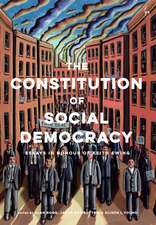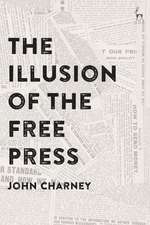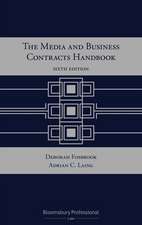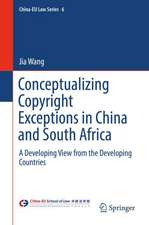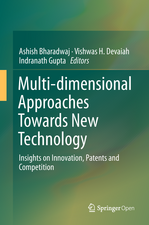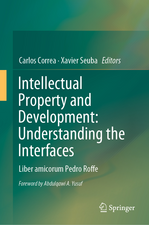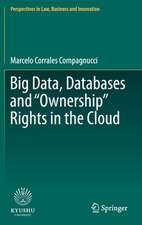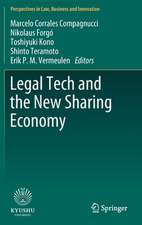Media Law
Autor Dr Jacob Rowbottomen Limba Engleză Paperback – 11 iul 2018
| Toate formatele și edițiile | Preț | Express |
|---|---|---|
| Paperback (2) | 252.76 lei 22-36 zile | +61.92 lei 6-12 zile |
| Bloomsbury Publishing – 6 mar 2024 | 252.76 lei 22-36 zile | +61.92 lei 6-12 zile |
| Bloomsbury Publishing – 11 iul 2018 | 368.93 lei 22-36 zile | +33.15 lei 6-12 zile |
| Hardback (1) | 722.53 lei 43-57 zile | |
| Bloomsbury Publishing – 6 mar 2024 | 722.53 lei 43-57 zile |
Preț: 368.93 lei
Nou
70.60€ • 73.89$ • 58.76£
Carte disponibilă
Livrare economică 10-24 martie
Livrare express 22-28 februarie pentru 43.14 lei
Specificații
ISBN-10: 1782256652
Pagini: 416
Dimensiuni: 169 x 244 x 27 mm
Greutate: 0.73 kg
Editura: Bloomsbury Publishing
Colecția Hart Publishing
Locul publicării:London, United Kingdom
Caracteristici
Notă biografică
Jacob Rowbottom is an Associate Professor at the Faculty of Law, University of Oxford and a Fellow of University College, Oxford.
Cuprins
1. Media Freedom I. Introduction II. Historical Background III. The Protection of Media Freedom in UK Law IV. Why Media Freedom is Different from Freedom of Expression V. The Functions of the Media VI. How is Media Freedom Protected? VII. What is the Media? VIII. Interferences with Media Freedom IX. Conclusion 2. Personal Rights: Reputation and Privacy I. Introduction II. Defamation Law III. Privacy IV. The Public Interest V. The Legal Protection of Personal Rights: Miscellaneous Provisions VI. Remedies VII. Conclusion 3. The Media and the System of Justice I. Introduction II. Contempt of Court III. Open Justice IV. Conclusion 4. Censorship, Obscenity and Secrecy I. Introduction II. Obscene, Indecent and Pornographic Content III. Government Secrecy and National Security IV. Terrorism V. Conclusion 5. Newsgathering I. Introduction II. Protecting Journalists' Sources III. Journalists' Material IV. Surveillance of Newsgathering Processes V. Freedom of Information VI. A Public Interest Defence VII. Conclusion 6. Media Regulation I. Introduction II. Regulating Content and Conduct III. Media Ownership and Concentration IV. Conclusion 7. The Digital Media I. Introduction II. Liability for Publications III. User-generated Content IV. Digital Intermediaries V. Conclusion 8. Conclusion I. The Changing Role of Public Opinion II. Media Law, Information Flows and Informal Controls III. The Methodology of Balancing in Media Law IV. Media Effects V. Media Power
Recenzii
The book gives the student reader a thorough and detailed account of the media law landscape. It offers up a wide-ranging and perceptive theoretical backdrop to debates on freedom of the individual versus freedom of the press, the thorny issue of privacy and where privacy rights lie, as well as incisive insights into topics as disparate as contempt, open justice and The book capably takes in its stride recent developments in media law and journalism since the Leveson Inquiry and how the press has adapted to a new ethical and regulatory framework and examines whether there has indeed a been a 'chilling effect' on the media since thew hacking scandal.A vigorous and challenging book, it is a must for students of media law and those interested in the new media landscape.
Descriere
Media law is a fast-developing area of scholarship that raises many high-profile and controversial questions. Recent issues include the use of privacy injunctions, the regulation of the press, the political power of media moguls, mass leaks of government information, and the responsibility of the digital media to prevent the spread of extreme content and fake news. This study looks at these issues and the key debates in media law. The book includes chapters examining the protection of personal rights to reputation and privacy, the administration of justice, the role of government censorship, the protection of the newsgathering process, the regulation of the media and the impact of digital communications. The analysis is grounded in an account of media freedom that looks at the important democratic functions performed by the media and journalism. Examining various key themes, this study shows how those functions continue to evolve in a changing political culture and also how the media are subject to a range of legal and informal constraints. The book asks whether the law strikes the right balance in protecting media freedom while preventing the abuse of media power, and considers the future of media law in the digital era. It is essential reading for students and scholars of media law alike.

